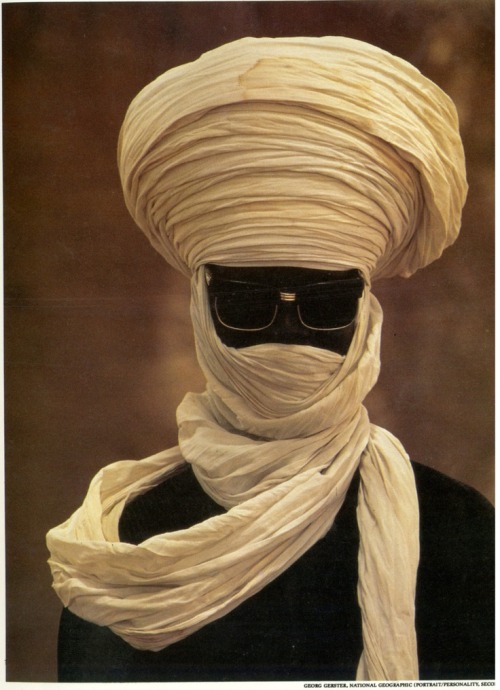#imohag
The Sahara is no more an arbitrary boundary than the Atlantic.
Seriously! And maybe I’m not thinking exactly what you’re thinking (edit: they were speaking a bit in the opposite way but not completely objecting to what I’m saying, being that I do mention the Sahara is in fact a boundary in many ways, just not monumentally), but… Too many people, and even scholars, seem to think so when it comes to interactions between so-called “Sub-Saharan” Africans – blacks, Negroes, Sudanese, etc. – and North Africans, and especially the sight of black people above the Sahel (wow!) or even the surprise from black intellectuals of “non-black” people, e.g. Berbers who many simply classify as Mediterranean – in the case of Sub-Saharan Africa, mostly Tuaregs, living below the Sahara. A lot of people like to classify them as Arabs also, this is not true.
Really, I’ve seen in contemporary times and learned historically of plenty black people [who were not foreigners, slaves, or of slave-descendant populations] from places like Morocco or even Tunisia, and on the contrary plenty “non-black” people from Mali or Niger where you wouldn’t expect to see anything but Negroes. Whether this be from Greek, Arab, or Maghrebi sources. This I’m saying all in regards to trade, war, slavery, general interaction, and actual habitation; really the regional history in all areas. Some points are barriers by default, but the entirety truly isn’t some monumental boundary between two worlds or two peoples; surely not a skin color boundary for either side, at least not literally everywhere across the Sahara.
That’s something I really plan to discuss when I can in the future: Tuaregs, “Moors” (pre-Islam; think Greek), Islamic Africa, Libyoaethiopes or even with Ancient Egypt’s demographics and all that good stuff. I think I did mention this just a little bit on my blog about Oualata (Walata), Mauritania as well with some writings from Ibn Battuta.
With that in mind, this notion that the Sahara is a “boundary” is typically associated with the ignorant belittling of African history, especially in West Africa. From the moment you learn of Islam in Africa for instance, it should become quite apparent that West Africa or the Swahili Coast (the Sahelian kingdoms – Mali, Ghana, Songhai – Wolof or Hausa states, Kilwa Kisiwani, Warsangali Sultanate, etc.) has a fruitful, interactive history in itself and with other parts of the world that is without argument worthy of praise.
Overall, people should really just study the entire Sahara-Sahel region more intensively. As you can also probably tell I’m most biased in favor of Islamic West Africa and the Maghreb as prime examples. And as someone who most specifically deals with ethnohistory, I’d say exploring the demographics and how race/skin color affected the regional history is a good idea as well. Maybe scholars like UMich Islamic history professor Dr. Rudolph Bilal Ware, or Chicago anthropologist Dr. Dana Reynolds-Marniche (to be quite honest, she is a bit Afrocentric in some areas so keep an open mind and open eyes). Maybe a good book, although it deals more-so with slavery, would be Black Morocco.
@internetnawab, Africans have had boats to traverse bodies of water for thousands of years. Africans have had legs, navigation skills, and the ability to survive in desert climates for millions of years.
Bodies of water are not barriers by default. The indigenous populations of the Pacific islands (which inhabit a stretch of ocean that dwarfs the Atlantic) are clear evidence of this. There are scholars who demonstrate that Africans had similar inclinations to explore the Atlantic rather than be bound by it.
Similarly, deserts are not barriers by default. There are populations that inhabit deserts globally–including the Sahara–and they have done so for thousands of years.
Positing the Sahara–or the Atlantic–as a barrier to Africans without qualification is dangerous. And I don’t often see people saying that of other extreme geographic phenomena that had the potential to influence migration patterns but were ultimately overcome. Why don’t we talk about “sub-Himalayan Asia” or “trans-Pacific Asia” or “sub-Chihuahuan America” or “super-Gobian Asia” or “sub-Caucasian Europe” or “sub-Alpine Europe?” I could go on.
We don’t talk about those regions in those ways because the implications of the term “sub-Saharan Africa” are overly racist in ways that are not applicable to anywhere else in the world.
I’ve addressed this kind of response before, but basically if you have no idea what I’m saying, maybe an ideologically-driven response where you refer to an imaginary history that includes assumptions of “default” states for humanity isn’t a great idea.
Might I say, from talking to @jugurthasrevenge personally about this matter, you honestly do have very little of an idea. She gets what I am saying, and what you are saying, it simply isn’t exactly what’s being said. I slightly misinterpeted the post myself. I won’t disclose private messages, but what I will let you know for sure is that she did in fact agree with me once we cleared things up (even giving the specific example of Hausa and Berber turbans being the same). The misunderstanding and debate is a simple matter of context. Although, her thing is that the Sahara [and Sahel if you want to be extra technical] is a barrier for Sub-Saharan “black” populations to the extent of their knowledge of navigation and their traveling caliber, so to say. And like I said before, the same goes for non-black North Africans; they most definitely aren’t limited to areas above the Sahel. And no black intellectual should be surprised to see a medium-toned person with wavy hair living in, say, Mali or Niger (the diverse Tuareg demographics for instance). And being mad that a certain North African population or some other foreign population was more fit to travel below the Sahara than those Sub-Saharan groups were fit to travel above the Sahara will do you no good. That’s just history. And with that being said, it isn’t fair to belittle someone else’s abilities simply because so & so isn’t on the same level. To say the least, it went either way, just in proper context.
At the same time, things like the Afrocentrist crap about a global Moorish empire or that the Moors built Europe, similarly trying to deny the obvious existance of non-black Africans overall or referring to them as Arabs, that African-Americans are descendants of ancient Egyptians (whether “black” or not–my thing is simply the context), claiming the Greeks and Romans were black simply because you saw a Roman sculpture of a Negro, pre-Colombian contact between Africans and indigenous Americans, or even the horse shit I am in the midst of destroying: the claim that Native Americans were black and the “white man” destroyed the “true history” so the “Injuns” could help take our land from us, etc… All that stuff is ridiculous. Not ridiculous as a possibility (besides the visually obvious things), rather as a serious claim, or even worse, an assertion; this simply because these theories are riddled with pseudo-history, and lack objective evidence. All of this crazy talk coming out of the Black Consciousness community is why this subject can be touchy, if the right scholars respond. Even for ancient Egypt, as I remember now that I mentioned, it’s all about the context with her thoughts on this subject. We agreed that obviously the Nile is a different story. Navigating a shared river valley is much less a hassle compared to navigating the Sahara or the Atlantic.
And honestly, enough with the fallacious mumbo jumbo about “Why is there no sub-[blank] Europe/Asia/etc.?” That’s like telling me the sky is blue, and my response is some speculative bullshit about “Well what if the color blue is actually purple?” Simply asking why something isn’t the way it is (in this case your asking why we don’t use similar terminology for other continents as we do with Africa) is not an argument for why you think otherwise.
Yes, deserts and waterways aren’t defaulted barriers with color lines and signs on either side saying “no [insert color here] allowed.” However, being able to row a boat across the Mediterranean, or to arrive in northeastern Libya by camelback, doesn’t mean such an ability and its outcome was or is an objective reality (specifically not for an Afrocentric revisionist context). I’m a simple man; all I ask for is a lack of bias, not using speculation as an argument, objective evidence, and clear citations.

Shades of Swagger # 86 | Undercover, Man in Niger. Photo by Georg Gerster for National Geographic, 1979
This pic has been one of my favorites for the past 5-6 years and I never knew where it was from.
Post link

















